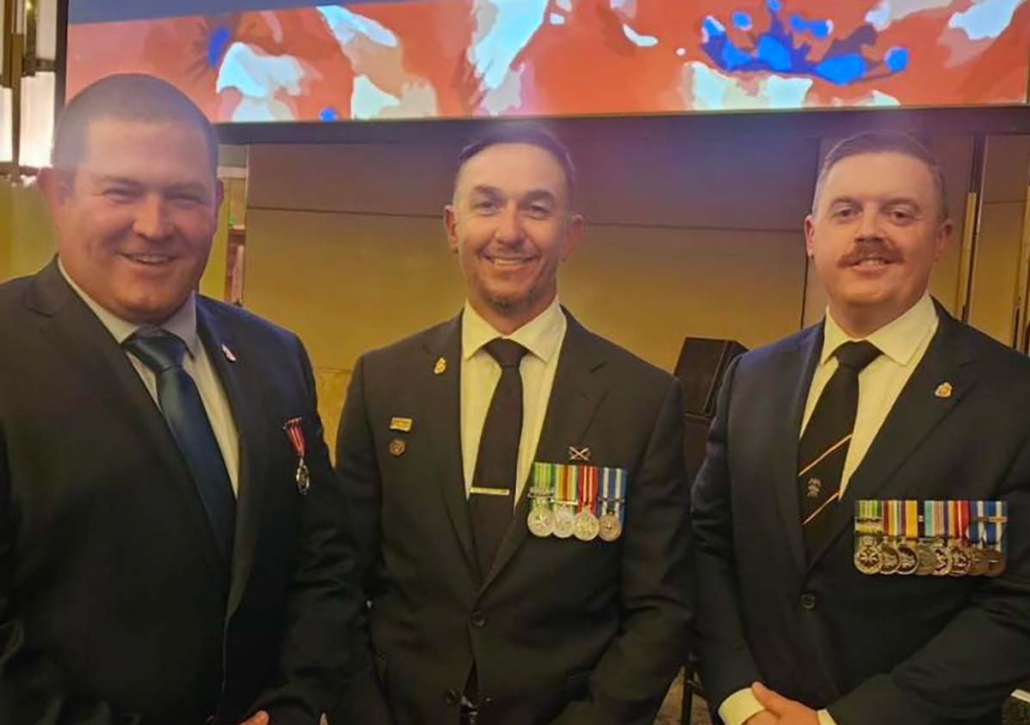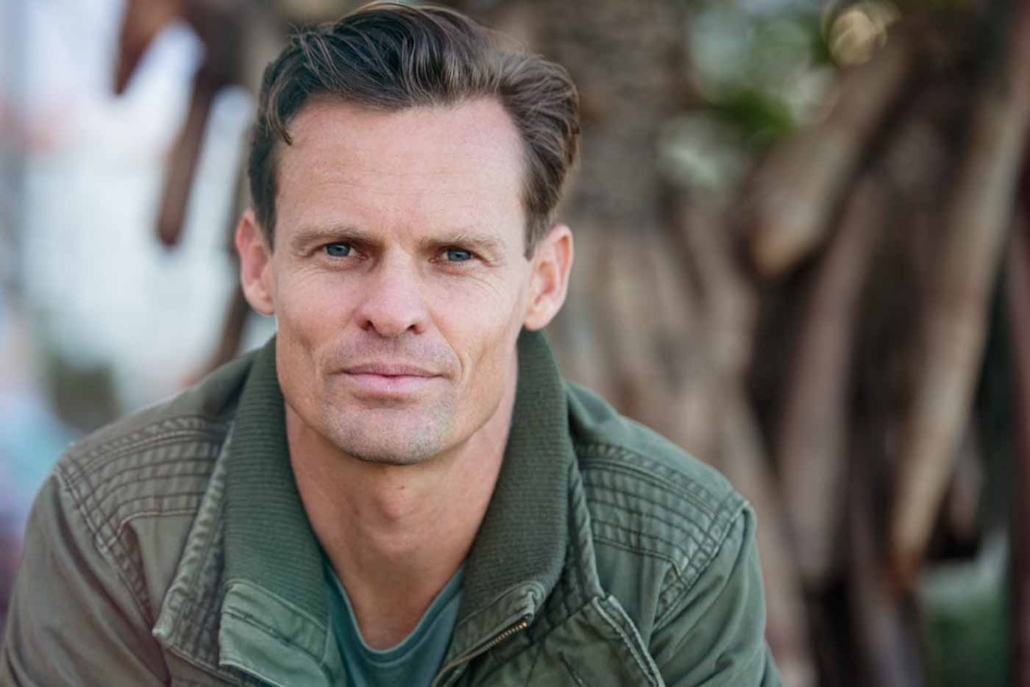Glen Ferrarotto Delivers Keynote Address at The Victorian Premiers Anniversary of ANZAC Day State Luncheon
Glen Ferrarotto, co-founder of Ironside Resources and a respected figure in the Veteran community, delivered a profoundly impactful speech at the Victorian Premier’s Anniversary of ANZAC Day State Luncheon on 9 April 2024. In his address, Glen candidly addressed the systemic shortcomings within veteran support organisations, shining a light on the pressing need for stronger advocacy and leadership in addressing issues that directly affect Veterans in Australia. As a former soldier and now a key figure in the Veteran community, Glen’s words resonated deeply with attendees, sparking a ripple of conversation and reflection throughout the room. This speech serves as a rallying cry for all Veterans and their families, urging us to come together, demand better, and strive for meaningful change. Read on for the full transcript of Glen’s powerful address.
Glen Ferrarotto’s keynote address at the Victorian Premiers Anniversary of ANZAC Day State Luncheon
“Rob – thank you for the kind introduction.
Your Excellency, Governor-General,
Current Serving Australian Defence Force Personnel and your families,
My fellow veterans and your families,
To Service and Affiliate members of our beautiful Returned and Services League of Australia,
Our Veterans Minister, the Honourable Natalie Suleyman,
And to the Premier of Victoria, Jacinta Allan –
Thank you for the opportunity to join you this afternoon as your keynote speaker.
In early 2009, I stepped out of full-time service in the Australian Army, having returned home from my second visit to Afghanistan.
My story of transition was common in 2009.
The Gold Standard Transition support package delivered through the Commonwealth Service Provider Right Management, currently offered to our serving personnel and their families, wasn’t available.
It was a lonely, scary, and daunting process that, as a Corporal, I had to navigate with only the support of my wife Rowena by my side.
Stepping out of Special Operations Command as support staff was perhaps even more isolating given the war in Afghanistan was escalating and the Command’s focus was rightly and stoically on the elimination of terrorism stemming from Afghanistan and the Middle East at the time.
Consideration of DVA entitlements was far from my mind. I didn’t have a white card, there were no veteran hubs, and no employment programs offered through RSLs or the State Government.
The notion that I may be suffering effects of the stresses of war didn’t even register as a consideration in planning out my future.
What I was focused on, was how I was going to establish myself as a civilian.
How could I use the skills and experiences that the Army had provided me to reach as high as I possibly could within what was a foreign landscape of corporate hierarchy?
Rowena and I knew the Army’s intent was to promote me and send us to Perth, a dream posting for us, however, we also knew that deep down our desire to start a family and remain back home here in Melbourne would ultimately guide our direction.
There was a profound moment some 12 months earlier that, in fact, marked the start of my transition journey though at the time it certainly didn’t register that way.
I was awarded an Australia Day Medallion in 2007 for services to Special Operations Command by Major General Hindmarsh. The citation read, ‘your enthusiastic, professional manner, and excellent management skills often required you to perform above the rank level that you currently wear.’
The night of receiving that award, I sat crying, inconsolably, in the lounge room of our married quarter. With Rowena’s embrace, I found the courage to admit I was scared; I was so scared that I had capped out my career and I had nowhere to go from there.
Two years earlier, I had been recommended for Officer Training by my previous OC following an opportunity to head to the Jungle Warfare Training Centre, and then onto Rifle Company Butterworth with 5/7 RAR as a Section Commander in a seconded ‘out of trade’ position. I sat the aptitude testing and I was unsuccessful.
To then receive an award by the Commander of Australian Special Operations telling me that I had the ability to do more than my worn rank would allow, through me, it confused me and I broke down thinking I had wasted my life.
Passing the Special Operations Entry Test and two deployments in quick succession to Afghanistan sat between that moment and my ultimate decision to transition from Regular Army.
I had a CV developed and I used Seek. I was applying for roles that I wasn’t qualified for but my experience in Army had taught me that holding a qualification wasn’t an indication of your ability to deliver outcomes or lead a workplace.
I took long-service leave from Army and began the interviewing process.
And my first interview was a complete disaster.
It lasted 10 seconds before the HR Manager paused me and said ‘you’re nervous, aren’t you.’ I responded yes and we agreed not to continue the interview.
My interviewer then offered her guidance, advice, and counsel on how to better prepare for next time. A small gesture that I remain grateful for, and one that ultimately guided the principles and foundation of our business.
By 2010, I was in my second career post Army.
My first role allowed me to bring small team leadership skills into the workplace which enhanced productivity as I led a team of engineers, technical writers, and illustrators on a Defence-related contract.
My second role moved me into Business Development with a large UK Defence Contractor. There, I was able to draw on my experience in Defence to help guide the development and integration of weapons and warfare systems into Australian Special Operations vehicles.
Immersed in the Defence Industry and all of its politics, I soon realised I could achieve more than I was enabled to do whilst employed and restricted by my role and allegiance to my employer’s brand.
So, I started a small consultancy of my own to test my theory, and with Rowena heavily pregnant I took another leap of faith and entered the world of entrepreneurship.
As a middleman for international arms dealers unable to break down the Australian, South East Asian, and Middle Eastern markets, I began using my networks, engagement skills, and street smarts in countries most wouldn’t venture to facilitate demonstrations and trade in a world full of dark and shady characters.
Not necessarily conducive to raising a family, that first business ‘Ironside Defence and Mining’ became Ironside Recruitment as Rowena and I switched focus to helping my former Army colleagues secure roles as they transitioned by using the networks in industry and government I had since developed.
There’s more to share about the business, and Google is a good source for information. Though what I will say is having been through the acquisition process twice with what is now called Ironside Resources, once selling the business and then buying it back, I can safely say the Australian Institute of Company Directors Course is no match for lived experience.
Over a decade on, Rowie and I are immensely proud of having established Ironside Resources and set its foundations here in our home state of Victoria. The brand is recognised across the country as a certified Social Enterprise responsible for paving the way for what is now an industry in its own right, veteran employment.” (speech continued below)
Hawthorn RSL Shared a Snippet of Glen’s Speech in Instagram
View this post on Instagram
“Ladies and Gentlemen, veterans and our families are no longer an ‘untapped’ resource, and it’s inaccurate and misleading to refer to them as such. There are now countless organisations, many of whom are charities that have pivoted into career support and recruitment for veterans.
But the reality is this. They are providing services akin to an existing 17 billion-dollar a year recruitment industry, overseen by professional associations, trade unions, and regulatory bodies governing the behavior of recruitment agencies and labor hire providers and these necessary layers of governance are currently lacking in the ESO, charitable veteran employment space.
The right fit, for the right job must remain the primary objective for both employers, employees, and those working in or on the fringe of the industry, which includes charities.
To influence recruitment based on targets or public messaging is irresponsible, and to do so only leads to unsustainable hire and fewer successful long-term outcomes. Significant to the veteran community however not unique to us is the risk of mental health and financial instability linked to poor recruiting practices, both of which are intrinsically linked.
Our State Government has demonstrated good leadership in the development and delivery of its own Veteran Employment Program supporting careers within the Victorian Public Sector for veterans and families, and
I thank Premier and our Minister for their ongoing commitment to that program. There is so much more to be done though and on behalf of us all may I ask of you the following:
Put your (our) money where it counts. Fund more beds for Ward 17 – Get our veterans off the street – Focus on the outcomes of the pending Royal Commission Report into Defence and Veteran Suicide and establish or maintain initiatives that continue to reduce the numbers of our friends taking their own lives.
Help us by promoting the positive aspects of ADF service and recognise our contribution to the Country, the State, to business, and to Community by putting us first.
It’s also the simple things that count, – things like protecting our Anzac Day March from groups planning to use our Country’s most sacred day to push their irresponsible agendas.
Don’t tell us to be more accepting and more respectful, tell them. Put simply, we fought for you, now you fight for us.
To my fellow RSL leaders and Service Members.
How do we want to be remembered? What position do we want to leave our 100-year-old institution? How can we help the ADF in their mission to recruit and to retain? When are we going to truly hold our governments accountable? Why aren’t we at the table? And I don’t mean bloody ESORT, I mean the real table, inside Parliament before decision and policy is made. Decisions on education, health, child and aged care, infrastructure and planning, the things that we agreed to go to war to protect and we have a right to hold influence on.
As League, we must do better and we must put ourselves back into a position of community leadership those far braver than us set the foundations for.
To those still serving in uniform. Thank you. We are here for you and your families when you make your decision, or the decision is made for you to transition. Don’t expect your journey to be an easy one. Don’t hold your hand out and wait for the support to come. If you’re a leader, lead by example. Use self-agency. Engage DVA early, Engage ADF Transitions early and build networks around you to use to your advantage. Everything you need to make a successful transition from the ADF to a Civilian life is at your fingertips. And never disregard the importance of community. Sporting clubs, school networks, associations, or interest groups. You will realise how valued your service and contribution are to this nation when you make friends with someone who has no connection to the Defence Force other than meeting you, and you will forge friends that will stay with you for a lifetime.
In 2019, 10 years after leaving the Army, I was diagnosed with Post-Traumatic Stress resulting from my service in Afghanistan. Throughout my entire civilian career up to that point, I was a nervous and anxious wreck. I would break out in facial acne before public speaking engagements. If I had meaningful contributions to make in group conversations, I’d remain quiet because the act of raising my hand to speak publicly would trigger crippling levels of anxiety. I suffered through this quietly and privately, avoiding those triggers and fearing the inevitable for years until Rowie challenged me to seek help. And through that process and engaging the Department, I got better, and I decided to use my own experience with DVA to help others, by getting inside the shed. That same year, I became aware of my dyslexia, a condition that, while now widely recognised and spoken of, was taboo for a young person completing high school in the Private System in Melbourne in 1997 hence I was never diagnosed. This realisation lifted a weight from my shoulders which had been present since not passing aptitude testing for Officer Training. I now knew why, and I could reconcile with that. Would it have made a difference if I had passed? Bloody oath it would have. It would have meant that every lesson I learned as a Non-Commissioned Officer, Every lesson I learned in the private sector as a Team leader and Business Development Manager, Every hard-earned business lesson I endured as an Entrepreneur and Company Director Through to my schooling in Bureaucracy at the highest echelons of the public sector in my role of A/g Repatriation Commissioner Every lesson would have been lost. And because nothing has ever come easy for me, I’ve never taken any of it for granted. My ADF service taught me to strive to achieve the highest levels of responsibility, accountability, leadership, and outcomes in each and every position I’ve held. These are values that we all share as veterans of the Australian Defence Force. This is what makes us unique, This is what makes us good employees, good business leaders, and good citizens. Ladies and Gentlemen, thank you for allowing me to share a small snippet of my journey with you today, and I hope in doing so I have inspired others to achieve whatever it is they set their mind to.”
In conclusion, the journey of transitioning from military service to civilian life is a unique and often challenging experience for Veterans and their families. Through the heartfelt recounting of his personal journey, Glen has shed light on the trials and triumphs faced by many Veterans as they navigate this transition. His story serves as an inspiration to all, reminding us of the resilience, determination, and unwavering commitment exemplified by our Veterans. As we reflect on his words, let us reaffirm our support for Veterans and their families, and continue to strive towards creating a community that honours their sacrifices and empowers their success in civilian life. Together, let us ensure that no Veteran walks alone on their journey towards a fulfilling and prosperous future.

 Ironside Resources
Ironside Resources Ironside Resources
Ironside Resources
 Ironside Resources
Ironside Resources Ironside Resources
Ironside Resources